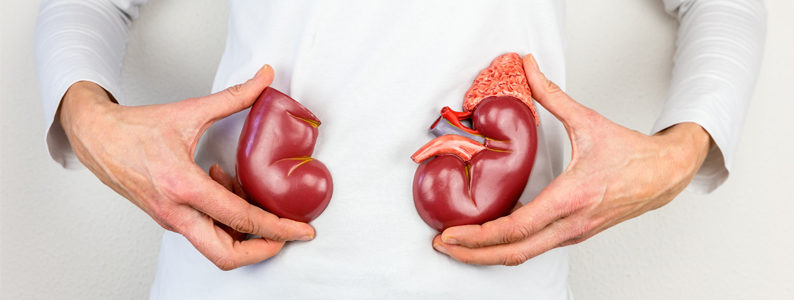
Kidney stones are—in the most literal sense—a pain. They are tiny, hard mineral/acid salt deposits that form in the kidneys. Though they usually have no singular cause, they typically form when the urine becomes concentrated, allowing these elements to crystallize and stick together. Why they form and what they’re made up of depends on the type of kidney stone. Types include:
- Calcium stones. Calcium stones form calcium or calcium oxalate. Oxalate is naturally found in certain foods (e.g., fruits, vegetables, chocolate and nuts) and is also produced by the liver. Situations such as having certain metabolic disorders, intestinal bypass surgery and high doses of vitamin D may increase the chances of calcium oxalate
- Cystine stones. Cystine stones form in individuals with a hereditary disorder—known as cystinuria—in which the kidneys release an excessive amount of certain amino acids
- Struvite stones. Struvite stones form in response to an infection. They can form quickly and can become quite large with little to no warning
- Uric acid stones. These stones are the result of a lack of fluid intake/loss of fluid, a high-protein diet or gout
With so many factors to consider, it’s no wonder kidney stones are so common. In fact, it may be the commonality that has led to so many home remedies. But, how effective are these “tried-and-true” at-home solutions to rid or prevent pesky kidney stones? Let’s take a look at some of the suggestions the internet has to offer:
Remedy #1: Steering clear of soda, coffee and tea will keep kidney stones at bay.
Effectiveness: Though this was once thought to be true by the scientific community, it has since been proven that these beverages do not increase the risk of kidney stones. In actuality, constant fluid intake—regardless of the type of fluid—generally decreases the risk. (Granted, water is always the best option.)
Remedy #2: Consuming Coke® and steamed asparagus will break down kidney stones.
Effectiveness: Some say that diuretic properties of the popular cola combined with the phosphoric acid of steamed asparagus—half a pound, to be exact—is a surefire way to dissolve kidney stones. While the origins of this are unknown, The University of Chicago officially classified this remedy as “useless.”
Remedy #3: Drinking cranberry juice will help kidney stones pass.
Effectiveness: ENT. Right system, wrong problem.
It has been suggested that cranberry juice may help with urinary tract infections (UTI), but the tart beverage can actually make stones worse. Cranberries are high in oxalate, which may increase the risk of kidney stone development.
Remedy #4: Avoid alcoholic beverages to decrease the risk of forming kidney stones.
Effectiveness: Diuretics have struck again, this time in the form of alcohol.
There was a concern that the diuretic properties of alcohol would be a risk factor for developing kidney stones. In reality, beer and wine consumption may actually decrease the risk (in moderation).
Remedy #5: Drinking lemon juice and olive oil can help kidney stones pass with ease.
Effectiveness: Besides being a gross combination, there is no confirmed evidence that the acids in lemons and the lubrication properties of olive oil will help kidney stones pass easily (or at all, for that matter).
What’s the bottom line?
Whether found on the web or passed down by generations, home remedies have no place in the proper prevention or treatment of kidney stones. In fact, treatment should be discussed with a specialist to determine the best course of action for dealing with kidney stones.
Meet the Kidney Stone Specialists
At Partners In Urology, we treat kidney stones and other urologic conditions. With over 25 years of experience, we put our patients first, treating them with care and dignity.
For more information or to schedule an appointment, contact us today.

